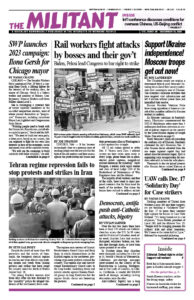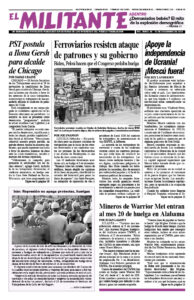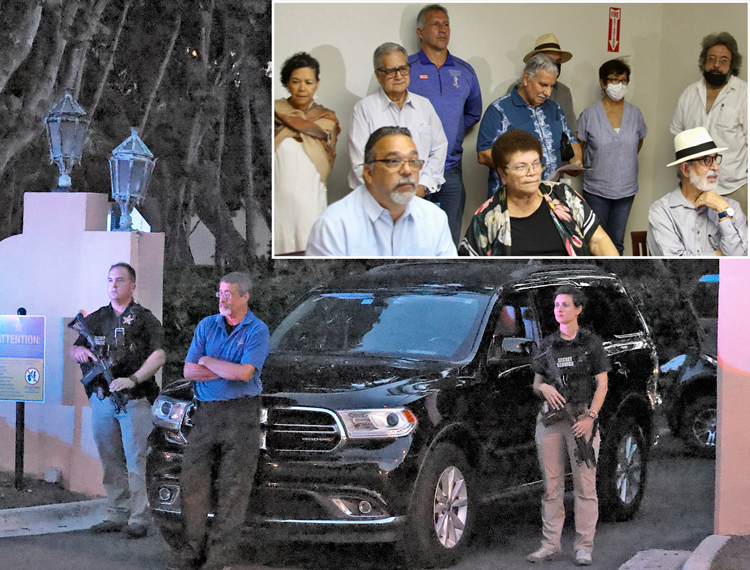Fifty Years of Covert Operations in the US: Washington’s Political Police and the American Working Class by Larry Seigle, Farrell Dobbs and Steve Clark is one of Pathfinder’s Books of the Month for December. It marks the capitalist rulers’ decision to turn the FBI into their political police and the historic victory in defense of constitutional rights won in the 1973-88 political and legal campaign waged by the Socialist Workers Party. Today, these freedoms are being violated and the FBI refurbished as the Democrats target Donald Trump, with an eye to battling deepening class struggle to come. The rulers are mounting more assaults on workers, farmers and their organizations. The excerpt is from the introduction. Copyright © 2014 by Pathfinder Press. Reprinted by permission.
The fifteen-year-long battle by the Socialist Workers Party, backed by thousands, resulting in that federal court ruling marked a victory for the working class. Moreover, that victory stands and has a direct effect to this day, more than four decades after the suit was filed. …
Fifty Years of Covert Operations in the US points to the century-and-a-half-long proletarian course that made possible what the Socialist Workers Party accomplished through its political campaign to expose government spying and harassment and mobilize opposition to it. From the moment the SWP led its lawsuit in 1973 through the 1981 trial and post-trial proceedings, the article says, the government
kept trying to prove that the party said one thing in public and something different in its closed meetings. They tried to establish that the party maintained dual structures, one for public purposes and the other hidden from view. In every case, the facts showed the opposite. While a workers’ party has the right, in fact the responsibility, to protect the privacy of its members and supporters from the bosses and the police, it has no right to keep its ideas, methods, and organizational concepts hidden from working people. …
As the trial demonstrated, the FBI’s accusations of conspiracy and hidden goals were pure projection. It turned out to be the White House and FBI, not the SWP, that conceal their aims and methods. It turned out to be the White House and FBI, not the SWP, that maintain a covert structure to carry out what they cannot openly proclaim. It turned out to be the White House and FBI, not the SWP, that rely on conspiratorial modes of operation to achieve their goals behind the backs of the people of the United States.
The article traces the expansion of Washington’s political police since US imperialism’s repressive response, in the aftermath of World War I, to the Bolshevik-led October 1917 revolution in Russia and forging of the Communist International two years later — and their impact on workers and farmers in the United States who sought to emulate those revolutionary examples. The government’s aim above all was to crush the newborn communist organizations in the US founded in 1919. (Already in those years, J. Edgar Hoover headed the Justice Department cop agency that targeted communist and anarchist workers, their organizations, and Black leaders such as Marcus Garvey and A. Philip Randolph. That agency became the Federal Bureau of Investigation in 1935, and Hoover remained its director until his death in 1972.)
This book puts a special focus on the Democratic administration of President Franklin Roosevelt in the late 1930s, as the US rulers prepared to enter the imperialist slaughter of World War II. It describes the growth and consolidation of the “national security” state in the wake of Washington’s military, political, and economic victory in that war over its imperialist rivals, both “foes” (Germany, Austria, Italy, and Japan) and “allies” (the United Kingdom, France, and others).
The 1941 conviction and imprisonment of eighteen leaders of the Socialist Workers Party and class-struggle Teamsters leadership in Local 544-CIO in Minneapolis was a turning point in the buildup of US capital’s political police. The frame-up was the Roosevelt administration’s first use of the Smith “Gag” Act outlawing advocacy of revolutionary ideas, which the Democratic president had signed into law the previous year. The real “crime” of these working-class leaders was that they were effectively organizing political opposition within the unions to Roosevelt’s drive to whip up popular support for the US rulers’ war aims that workers and farmers would be sent to fight and die for. …
During the 1981 trial of the SWP’s lawsuit, a chief government witness, Robert Keuch, an associate deputy attorney general, was questioned by an attorney for the SWP about Roosevelt’s 1939 executive order directing the FBI to step up its “investigation” of “subversive activities.” Keuch replied that “there are simply ways that individuals and groups can act that may not necessarily constitute violations of the criminal statutes” (translation: that are legal even under US bourgeois law). The White House was concerned first and foremost about those “who were trying to influence public opinion to keep the United States out of war, to keep us neutral,” the Justice Department official testified.
The “crime” of “trying to influence public opinion” about the coming war was sufficient for Roosevelt to shred the Bill of Rights. …
Each step toward putting an end to the ability of the propertied rulers to legally operate in secrecy is an advance for working people in the U.S. …
For communist workers, defending ourselves is not primarily a question of legal arguments and courtroom tactics, although revolutionary-minded workers approach these matters with the utmost proletarian discipline and attention to detail.
Like everything else in the class struggle, how working people defend ourselves in face of frame-ups and other government assaults is above all a political question. It is part of the working class advancing along the revolutionary course toward replacing the state power of a tiny minority of propertied families — the dictatorship of capital — with that of the great majority, workers and farmers.


